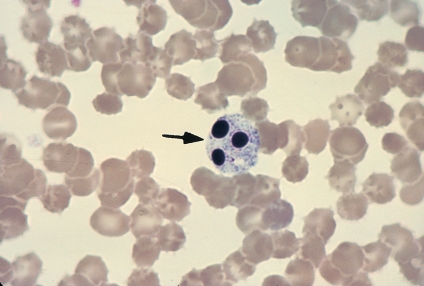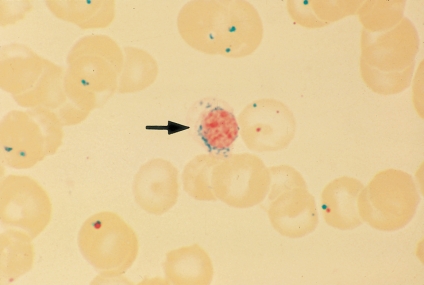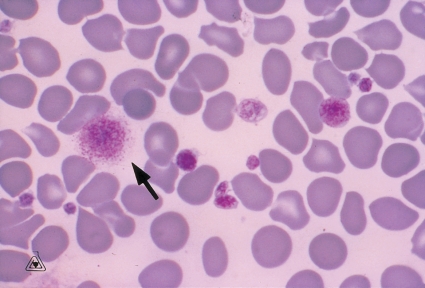Deck 14: The Myelodysplastic Syndromes
Question
Question
Question
Question
Question
Question
Question
Question
Question
Question
Question
Question
Question
Question
Question
Question
Question
Question
Question
Question

Unlock Deck
Sign up to unlock the cards in this deck!
Unlock Deck
Unlock Deck
1/20
Play
Full screen (f)
Deck 14: The Myelodysplastic Syndromes
1
All of the following are associated with the development of the MDSs except:
A) Alkylating therapy
B) Benzene exposure
C) Alcoholism
D) Radiation
A) Alkylating therapy
B) Benzene exposure
C) Alcoholism
D) Radiation
C
2
The most common hematological malignancy in the adult population is:
A) Acute leukemia
B) Multiple myeloma
C) Myelodysplastic syndrome
D) Chronic leukemias
A) Acute leukemia
B) Multiple myeloma
C) Myelodysplastic syndrome
D) Chronic leukemias
C
3

The cell at the tip of the pointer is:
A) A basophil
B) A malignant cell
C) A degenerating neutrophil
D) Not a cell; it's an artifact
C
4

The correct name for the cell at the end of the pointer is a:
A) Ringed sideroblast
B) Reticulocyte
C) Giant platelet
D) Siderocyte

Unlock Deck
Unlock for access to all 20 flashcards in this deck.
Unlock Deck
k this deck
5
Refractory anemia is an anemia that:
A) Has more than 5% blasts in the peripheral blood
B) Is resistant to treatment
C) Will usually demonstrate a hypoplastic bone marrow
D) Demonstrates a 17g deletion routinely
A) Has more than 5% blasts in the peripheral blood
B) Is resistant to treatment
C) Will usually demonstrate a hypoplastic bone marrow
D) Demonstrates a 17g deletion routinely

Unlock Deck
Unlock for access to all 20 flashcards in this deck.
Unlock Deck
k this deck
6
The bone marrow and peripheral smear of a patient with an MDS will show dysplastic changes in _over time.
A) white cells
B) red cells
C) platelets
D) All of the above
A) white cells
B) red cells
C) platelets
D) All of the above

Unlock Deck
Unlock for access to all 20 flashcards in this deck.
Unlock Deck
k this deck
7

The cell at the tip of the pointer is a:
A) Hairy cell
B) Basket cell
C) Degenerating lymphocyte
D) Giant platelet

Unlock Deck
Unlock for access to all 20 flashcards in this deck.
Unlock Deck
k this deck
8
All of the following are features of the myelodysplastic syndromes except:
A) Anemia
B) Organomegaly
C) Dysplasia
D) Hypercellular marrow
A) Anemia
B) Organomegaly
C) Dysplasia
D) Hypercellular marrow

Unlock Deck
Unlock for access to all 20 flashcards in this deck.
Unlock Deck
k this deck
9
One of the key white cell features in MDS is:
A) Hypersegmented neutrophils
B) Auer rods
C) Dohle bodies
D) Pseudo Pelger-Huët
A) Hypersegmented neutrophils
B) Auer rods
C) Dohle bodies
D) Pseudo Pelger-Huët

Unlock Deck
Unlock for access to all 20 flashcards in this deck.
Unlock Deck
k this deck
10
Which of the following bone marrow blast percentages will be consistent with the FAB classification of refractory anemia with excess of blasts (RAEB)?
A) 5% to 20%
B) 20% to 30%
C) Greater than 30%
D) Less than 5%
A) 5% to 20%
B) 20% to 30%
C) Greater than 30%
D) Less than 5%

Unlock Deck
Unlock for access to all 20 flashcards in this deck.
Unlock Deck
k this deck
11
The most effective means of treating iron overload in the myelodysplastic syndromes is:
A) Therapeutic phlebotomy
B) Limiting iron-containing foods
C) Iron chelation therapy
D) Fasting
A) Therapeutic phlebotomy
B) Limiting iron-containing foods
C) Iron chelation therapy
D) Fasting

Unlock Deck
Unlock for access to all 20 flashcards in this deck.
Unlock Deck
k this deck
12
A large percentage of the MDSs end in an acute leukemia.

Unlock Deck
Unlock for access to all 20 flashcards in this deck.
Unlock Deck
k this deck
13
Reticulocytopenia is a feature of MDS.Which one of the following is the mechanism behind this process?
A) Heavy tumor burden
B) Marrow aplasia
C) Ineffective erythropoiesis
D) Toxic effects
A) Heavy tumor burden
B) Marrow aplasia
C) Ineffective erythropoiesis
D) Toxic effects

Unlock Deck
Unlock for access to all 20 flashcards in this deck.
Unlock Deck
k this deck
14
The FAB classification of the MDSs include CML.

Unlock Deck
Unlock for access to all 20 flashcards in this deck.
Unlock Deck
k this deck
15
The blast count in most individuals with MDS is:
A) Less than 10%
B) Less than 40%
C) Less than 5%
D) Less than 20%
A) Less than 10%
B) Less than 40%
C) Less than 5%
D) Less than 20%

Unlock Deck
Unlock for access to all 20 flashcards in this deck.
Unlock Deck
k this deck
16
Typically, patients with MDS will exhibit partial or complete absence of:
A) Chromosomes 5 and 7
B) Chromosomes 8 and 12
C) The Y chromosome
D) Dysplasia
A) Chromosomes 5 and 7
B) Chromosomes 8 and 12
C) The Y chromosome
D) Dysplasia

Unlock Deck
Unlock for access to all 20 flashcards in this deck.
Unlock Deck
k this deck
17
Deleted 5q MDS is primarily seen in male patients.

Unlock Deck
Unlock for access to all 20 flashcards in this deck.
Unlock Deck
k this deck
18
The morphological classification of anemia in the myelodysplastic syndromes is:
A) Normocytic, normochromic
B) Microcytic, hypochromic
C) Macrocytic, normochromic
D) Microcytic, normochromic
A) Normocytic, normochromic
B) Microcytic, hypochromic
C) Macrocytic, normochromic
D) Microcytic, normochromic

Unlock Deck
Unlock for access to all 20 flashcards in this deck.
Unlock Deck
k this deck
19
Which of the following chromosome disorders in MDS has a poor predictive influence?
A) Chromosome 7 disorder
B) Trisomy 12
C) Trisomy 13
D) 17q deletion
A) Chromosome 7 disorder
B) Trisomy 12
C) Trisomy 13
D) 17q deletion

Unlock Deck
Unlock for access to all 20 flashcards in this deck.
Unlock Deck
k this deck
20
All of the following are dysplastic changes of platelets frequently seen in MDS except:
A) Abnormal granulation
B) Micromega karyocytes
C) Giant platelets
D) Platelet satellitism
A) Abnormal granulation
B) Micromega karyocytes
C) Giant platelets
D) Platelet satellitism

Unlock Deck
Unlock for access to all 20 flashcards in this deck.
Unlock Deck
k this deck


